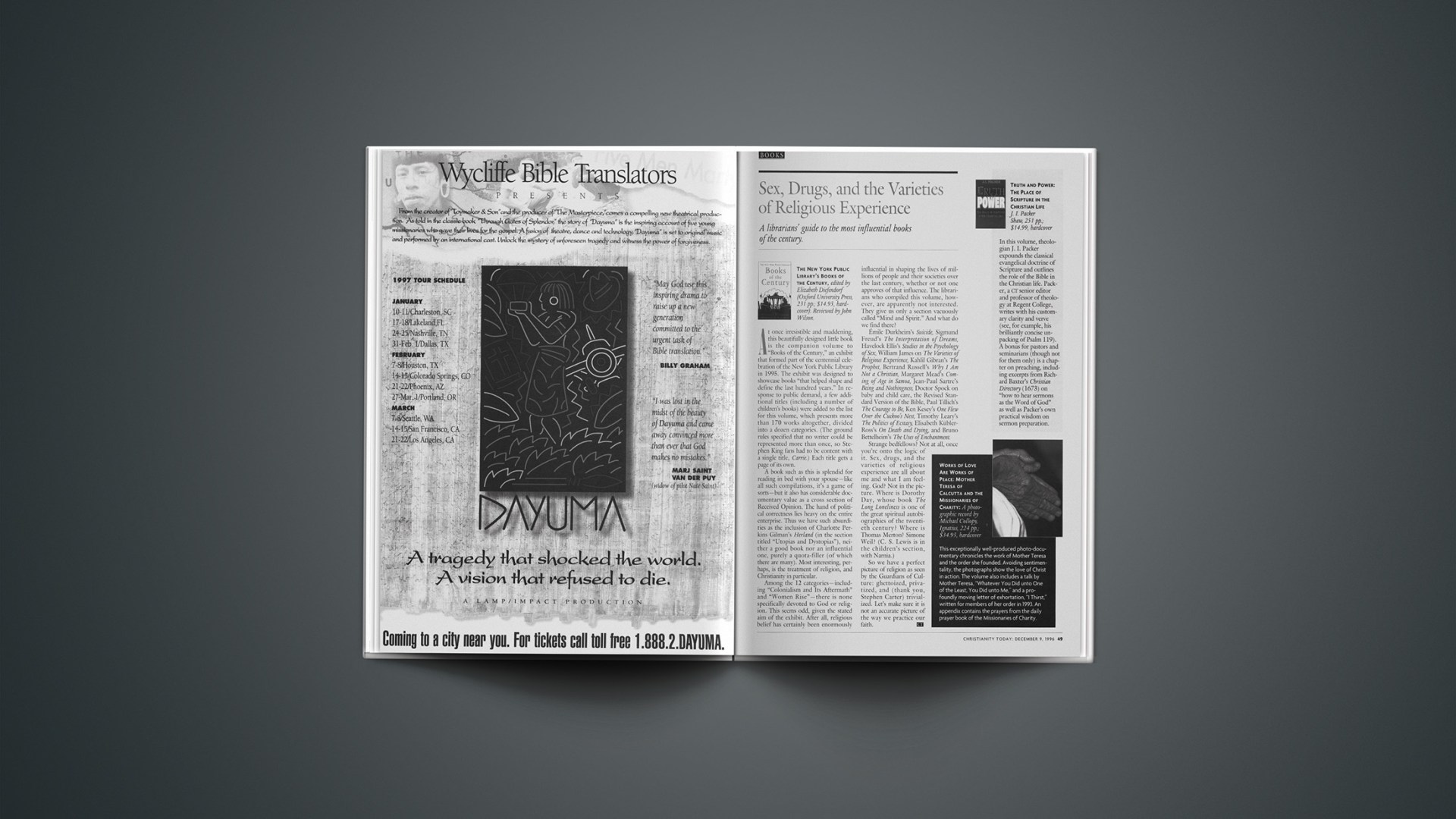The New York Public Library’s Books of the Century,edited by Elizabeth Diefendorf (Oxford University Press, 231 pp.; $14.95, hardcover). Reviewed by John Wilson.
At once irresistible and maddening, this beautifully designed little book is the companion volume to “Books of the Century,” an exhibit that formed part of the centennial celebration of the New York Public Library in 1995. The exhibit was designed to showcase books “that helped shape and define the last hundred years.” In response to public demand, a few additional titles (including a number of children’s books) were added to the list for this volume, which presents more than 170 works altogether, divided into a dozen categories. (The ground rules specified that no writer could be represented more than once, so Stephen King fans had to be content with a single title, Carrie. ) Each title gets a page of its own.
A book such as this is splendid for reading in bed with your spouse—like all such compilations, it’s a game of sorts—but it also has considerable documentary value as a cross section of Received Opinion. The hand of political correctness lies heavy on the entire enterprise. Thus we have such absurdities as the inclusion of Charlotte Perkins Gilman’s Herland (in the section titled “Utopias and Dystopias”), neither a good book nor an influential one, purely a quota-filler (of which there are many). Most interesting, perhaps, is the treatment of religion, and Christianity in particular.
Among the 12 categories—including “Colonialism and Its Aftermath” and “Women Rise”—there is none specifically devoted to God or religion. This seems odd, given the stated aim of the exhibit. After all, religious belief has certainly been enormously influential in shaping the lives of millions of people and their societies over the last century, whether or not one approves of that influence. The librarians who compiled this volume, however, are apparently not interested. They give us only a section vacuously called “Mind and Spirit.” And what do we find there?
Emile Durkheim’s Suicide, Sigmund Freud’s The Interpretation of Dreams, Havelock Ellis’s Studies in the Psychology of Sex, William James on The Varieties of Religious Experience, Kahlil Gibran’s The Prophet, Bertrand Russell’s Why I Am Not a Christian, Margaret Mead’s Coming of Age in Samoa, Jean-Paul Sartre’s Being and Nothingness, Doctor Spock on baby and child care, the Revised Standard Version of the Bible, Paul Tillich’s The Courage to Be, Ken Kesey’s One Flew Over the Cuckoo’s Nest, Timothy Leary’s The Politics of Ecstasy, Elisabeth Kubler-Ross’s On Death and Dying, and Bruno Bettelheim’s The Uses of Enchantment.
Strange bedfellows? Not at all, once you’re onto the logic of it. Sex, drugs, and the varieties of religious experience are all about me and what I am feeling. God? Not in the picture. Where is Dorothy Day, whose book The Long Loneliness is one of the great spiritual autobiographies of the twentieth century? Where is Thomas Merton? Simone Weil? (C. S. Lewis is in the children’s section, with Narnia.)
So we have a perfect picture of religion as seen by the Guardians of Culture: ghettoized, privatized, and (thank you, Stephen Carter) trivialized. Let’s make sure it is not an accurate picture of the way we practice our faith.
Short Notices
Truth and Power: The Place of Scripture in the Christian LifeJ. I. Packer Shaw, 251 pp.; $14.99, hardcover
In this volume, theologian J. I. Packer expounds the classical evangelical doctrine of Scripture and outlines the role of the Bible in the Christian life. Packer, a ct senior editor and professor of theology at Regent College, writes with his customary clarity and verve (see, for example, his brilliantly concise unpacking of Psalm 119). A bonus for pastors and seminarians (though not for them only) is a chapter on preaching, including excerpts from Richard Baxter’s Christian Directory (1673) on “how to hear sermons as the Word of God” as well as Packer’s own practical wisdom on sermon preparation.
Works of Love Are Works of Peace: Mother Teresa of Calcutta and the Missionaries of Charity: A photographic record by Michael CollopyIgnatius, 224 pp.; $34.95, hardcoverThis exceptionally well-produced photo-documentary chronicles the work of Mother Teresa and the order she founded. Avoiding sentimentality, the photographs show the love Christ in action. The volume also includes a talk by Mother Teresa, “Whatever You Did unto One of the Least, You Did unto Me,” and a profoundly moving letter of exhortation, “I Thirst,” written for members of her order in 1993. An appendix contains the prayers from the daily prayer book of the Missionaries of Charity.
Copyright © 1996 Christianity Today. Click for reprint information.










